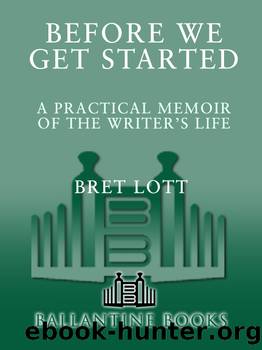Before We Get Started by Bret Lott

Author:Bret Lott [Lott, Bret]
Language: eng
Format: epub
ISBN: 978-0-307-80480-8
Publisher: Random House Publishing Group
Published: 2011-08-17T00:00:00+00:00
And though he is here writing of fiction, it has been my own discovery as a writer of both fiction and creative nonfiction that the same holds true for both. Without the consciousness of the artistâwithout the unique being seeing the human condition we all of us see each and every day of our lives through the singular window behind which we standâthere can be no art, whether of the fictive form or factual, and the unfortunate and blessed truth of this is that there can be no teaching to you any technique for being the unique being you are. To believe in technique is to pretend there is only a certain size and shape window that will allow us to see, and to pretend there is only one watcher behind them all. To pretend there is a technique or even a compendium of techniques that will give you you, is to pretend there is only one essay, and one story, and one poem.
Technique, of course, can be taught. Its result, however, is a kind of uniformity that yields not art, but artifice. I know this firsthand, having twice been on the Literature Fellowships panel for the National Endowment for the Arts in both fiction and creative nonfiction. After reading hundreds and hundreds of manuscripts, the one constant I saw that arose from them all, the one common denominatorâand it was, let me assure you, a most common denominatorâwas the technical competence of the works at hand. They were technically competent. Nothing more, nothing less. Only competenceâcreative nonfiction and fiction alike all told well, whether in any number of obtuse or conventional waysâthat revealed a kind of routine verbal acumen, but which had, sad to say, no heart. No soul. Only windows all alike and all in a row, behind them merely automatons dressed in various costumes of style, but automatons nonetheless.
Because when the consciousness of the artist is neglected for technique, the result is often serviceable, may resemble truth, but it will never be alive. This is from Arthur Schopenhauer, the nineteenth-century German philosopher and supreme pessimist, on the folly of making reality more important than its perception by the artist:
Waxwork figures make no aesthetic impression and are consequently not works of art (in the aesthetic sense), although when they are well made they produce a far greater illusion of reality than the best picture or statue can and if imitation of the actual were the aim of art would have to be accorded the first rank. For they seem to present not the pure form but with it the material as well, so that they bring about the illusion that the thing itself is standing there. The true work of art leads us from that which exists only once and never again, i.e., the individual, to that which exists perpetually and time and time again in innumerable manifestations ⦠but the waxwork figure appears to present the individual itself, that is to say that which exists only once and never again, but without that which lends value to such fleeting existence, without life.
Download
This site does not store any files on its server. We only index and link to content provided by other sites. Please contact the content providers to delete copyright contents if any and email us, we'll remove relevant links or contents immediately.
| Authorship | Bibliographies & Indexes |
| Book Industry |
Asking the Right Questions: A Guide to Critical Thinking by M. Neil Browne & Stuart M. Keeley(5764)
Autoboyography by Christina Lauren(5228)
Eat That Frog! by Brian Tracy(4526)
Dialogue by Robert McKee(4389)
Sticky Fingers by Joe Hagan(4189)
Journeys Out of the Body by Robert Monroe(3619)
Annapurna by Maurice Herzog(3464)
Full Circle by Michael Palin(3443)
Schaum's Quick Guide to Writing Great Short Stories by Margaret Lucke(3376)
Elements of Style 2017 by Richard De A'Morelli(3343)
The Art of Dramatic Writing: Its Basis in the Creative Interpretation of Human Motives by Egri Lajos(3063)
Atlas Obscura by Joshua Foer(2955)
Why I Write by George Orwell(2945)
The Fight by Norman Mailer(2930)
The Diviners by Libba Bray(2927)
In Patagonia by Bruce Chatwin(2922)
The Mental Game of Writing: How to Overcome Obstacles, Stay Creative and Productive, and Free Your Mind for Success by James Scott Bell(2904)
Venice by Jan Morris(2570)
The Elements of Style by William Strunk and E. B. White(2470)
